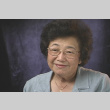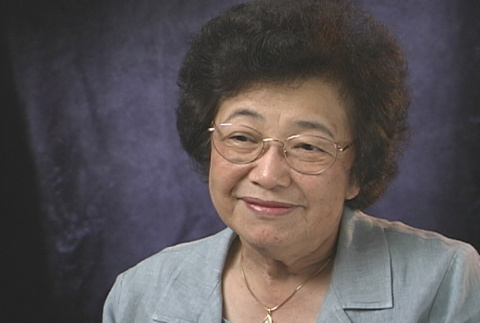50 items
- 1
- 2

vh
Marion Tsutakawa Kanemoto Interview (ddr-densho-1000-148)
Nisei female. Born December 30, 1927, in Seattle, Washington. Lived in Japan for fifteen months as a child, before returning to Seattle to attend junior high school. After the bombing of Pearl Harbor, father was picked up by the FBI and taken to the Department of Justice camp at Missoula, Montana. Removed to the Puyallup Assembly …

vh
Marion Tsutakawa Kanemoto Interview Segment 28 (ddr-densho-1000-148-28)
Receiving censored letters from father; feeling the uncertainty of future

vh
Marion Tsutakawa Kanemoto Interview Segment 42 (ddr-densho-1000-148-42)
Attending Doshisha University in Japan after the war; dealing with the scarcity of food

vh
Marion Tsutakawa Kanemoto Interview Segment 23 (ddr-densho-1000-148-23)
Dealing with the difficulties of living in the Puyallup Assembly Center, new responsibilities as the oldest child at age fourteen

vh
Marion Tsutakawa Kanemoto Interview Segment 43 (ddr-densho-1000-148-43)
Working for a U.S. army station hospital library; seizing an opportunity to return to the United States

vh
Marion Tsutakawa Kanemoto Interview Segment 26 (ddr-densho-1000-148-26)
Attending a makeshift high school in camp: "it was a very sparse situation"

vh
Marion Tsutakawa Kanemoto Interview Segment 3 (ddr-densho-1000-148-3)
Birthdate changed by mother due to Japanese customs

vh
Marion Tsutakawa Kanemoto Interview Segment 7 (ddr-densho-1000-148-7)
Living in Japan for fifteen months as a child

vh
Marion Tsutakawa Kanemoto Interview Segment 15 (ddr-densho-1000-148-15)
Little awareness of the war in Europe and Asia before the bombing of Pearl Harbor

vh
Marion Tsutakawa Kanemoto Interview Segment 19 (ddr-densho-1000-148-19)
Father sent to Department of Justice camp in Missoula, Montana

vh
Marion Tsutakawa Kanemoto Interview Segment 5 (ddr-densho-1000-148-5)
Explanation of names; speaking Japanese while growing up

vh
Marion Tsutakawa Kanemoto Interview Segment 33 (ddr-densho-1000-148-33)
Living in Japan during the war: leaving the family home and moving into a house built by father

vh
Marion Tsutakawa Kanemoto Interview Segment 21 (ddr-densho-1000-148-21)
Seeing a photo of father being picked up by FBI in local newspaper; coping with life without father

vh
Marion Tsutakawa Kanemoto Interview Segment 34 (ddr-densho-1000-148-34)
Attending high school in Japan, being singled out as an American

vh
Marion Tsutakawa Kanemoto Interview Segment 30 (ddr-densho-1000-148-30)
Leaving for Japan on the SS Gripsholm, part of the U.S. government-sponsored "exchange"

vh
Marion Tsutakawa Kanemoto Interview Segment 32 (ddr-densho-1000-148-32)
Living in father's family home in Japan during the war

vh
Marion Tsutakawa Kanemoto Interview Segment 41 (ddr-densho-1000-148-41)
Acting as an interpreter for the American occupation officers who came to the high school

vh
Marion Tsutakawa Kanemoto Interview Segment 45 (ddr-densho-1000-148-45)
Studying at St. Mary's teaching hospital; participating in social activities

vh
Marion Tsutakawa Kanemoto Interview Segment 38 (ddr-densho-1000-148-38)
Contracting a serious case of pleurisy, leaving school and working in a factory to help the war effort

vh
Marion Tsutakawa Kanemoto Interview Segment 18 (ddr-densho-1000-148-18)
Visiting father at the immigration office: he passes a clandestine message to mother

vh
Marion Tsutakawa Kanemoto Interview Segment 13 (ddr-densho-1000-148-13)
Description of the Pacific Market, father's business

vh
Marion Tsutakawa Kanemoto Interview Segment 11 (ddr-densho-1000-148-11)
Holiday celebrations, attending the Episcopal church

vh
Marion Tsutakawa Kanemoto Interview Segment 31 (ddr-densho-1000-148-31)
Stopping in Goa, India, to board the Japanese troop ship Teiya maru; memories of terrible food, Japanese language classes
- 1
- 2
